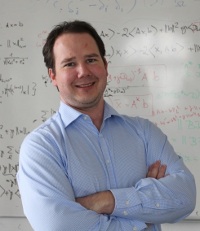iTWIST’16 Keynote Speakers: Holger Rauhut
At this year’s international Travelling Workshop on Interactions between Sparse models and Technology (iTWIST) we have keynote speakers from several different scientific backgrounds. Our next speaker is a mathematician with a solid track record in compressed sensing and matrix/tensor completion: Holger Rauhut.
 Holger Rauhut is Professor for Mathematics and Head of Chair C for Mathematics (Analysis) at RWTH Aachen University. Professor Rauhut came to RWTH Aachen in 2013 from a position as Professor for Mathematics at the Hausdorff Center for Mathematics, University of Bonn since 2008.
Holger Rauhut is Professor for Mathematics and Head of Chair C for Mathematics (Analysis) at RWTH Aachen University. Professor Rauhut came to RWTH Aachen in 2013 from a position as Professor for Mathematics at the Hausdorff Center for Mathematics, University of Bonn since 2008.
Professor Rauhut has, among many other things, written the book A Mathematical Introduction to Compressive Sensing together with Simon Foucart and published important research contributions about structured random matrices.
At the coming iTWIST workshop I am looking very much forward to hearing Holger Rauhut speak about low-rank tensor recovery. This is especially interesting because, while the compressed sensing (one-dimensional) or the matrix completion (two-dimensional) problems are relatively straightforward to solve, things start getting much more complicated when you try to generalise it from ordinary vectors or matrices to higher-order tensors. Algorithms for the general higher-dimensional case seem to be much more elusive and I am sure that Holger Rauhut can enlighten us on this topic (joint work with Reinhold Schneider and Zeljka Stojanac):
Low rank tensor recovery
An extension of compressive sensing predicts that matrices of low rank can be recovered from incomplete linear information via efficient algorithms, for instance nuclear norm minimization. Low rank representations become much more efficient one passing from matrices to tensors of higher order and it is of interest to extend algorithms and theory to the recovery of low rank tensors from incomplete information. Unfortunately, many problems related to matrix decompositions become computationally hard and/or hard to analyze when passing to higher order tensors. This talk presents two approaches to low rank tensor recovery together with (partial) results. The first one extends iterative hard thresholding algorithms to the tensor case and gives a partial recovery result based on a variant of the restricted isometry property. The second one considers relaxations of the tensor nuclear norm (which itself is NP-hard to compute) and corresponding semidefinite optimization problems. These relaxations are based on so-called theta bodies, a concept from convex algebraic geometry. For both approaches numerical experiments are promising but a number of open problems remain.